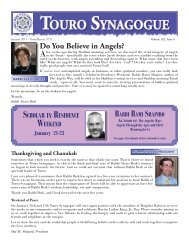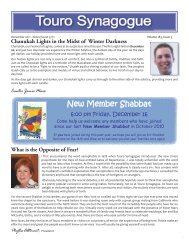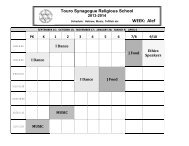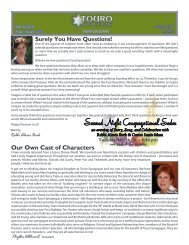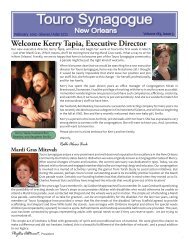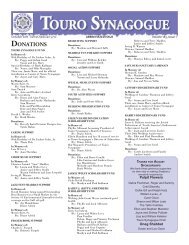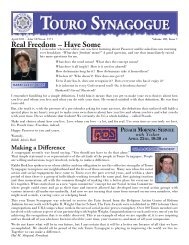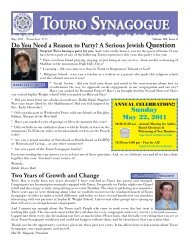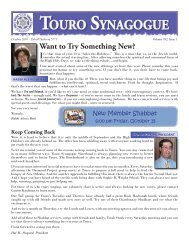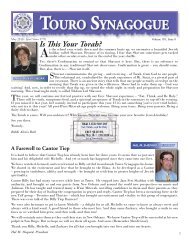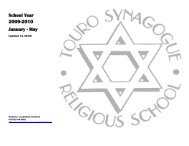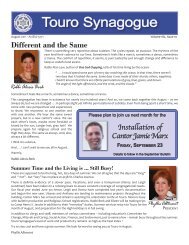Reform Judaism for Teachers module - Touro Synagogue
Reform Judaism for Teachers module - Touro Synagogue
Reform Judaism for Teachers module - Touro Synagogue
Create successful ePaper yourself
Turn your PDF publications into a flip-book with our unique Google optimized e-Paper software.
Pittsburgh Plat<strong>for</strong>m ‐ 1885<br />
1. We recognize in every religion an attempt to grasp the Infinite, and in every mode, source or<br />
book of revelation held sacred in any religious system the consciousness of the indwelling of God<br />
in man. We hold that <strong>Judaism</strong> presents the highest conception of the God‐idea as taught in our<br />
Holy Scriptures and developed and spiritualized by the Jewish teachers, in accordance with the<br />
moral and philosophical progress of their respective ages. We maintain that <strong>Judaism</strong> preserved<br />
and defended midst continual struggles and trials and under en<strong>for</strong>ced isolation, this God‐idea as<br />
the central religious truth <strong>for</strong> the human race.<br />
2. We recognize in the Bible the record of the consecration of the Jewish people to its mission as<br />
the priest of the one God, and value it as the most potent instrument of religious and moral<br />
instruction. We hold that the modern discoveries of scientific researches in the domain of nature<br />
and history are not antagonistic to the doctrines of <strong>Judaism</strong>, the Bible reflecting the primitive<br />
ideas of its own age, and at times clothing its conception of divine Providence and Justice dealing<br />
with men in miraculous narratives.<br />
3. We recognize in the Mosaic legislation a system of training the Jewish people <strong>for</strong> its mission<br />
during its national life in Palestine, and today we accept as binding only its moral laws, and<br />
maintain only such ceremonies as elevate and sanctify our lives, but reject all such as are not<br />
adapted to the views and habits of modern civilization.<br />
4. We hold that all such Mosaic and rabbinical laws as regulate diet, priestly purity, and dress<br />
originated in ages and under the influence of ideas entirely <strong>for</strong>eign to our present mental and<br />
spiritual state. They fail to impress the modern Jew with a spirit of priestly holiness; their<br />
observance in our days is apt rather to obstruct than to further modern spiritual elevation.<br />
5. We recognize, in the modern era of universal culture of heart and intellect, the approaching of<br />
the realization of Israel s great Messianic hope <strong>for</strong> the establishment of the kingdom of truth,<br />
justice, and peace among all men. We consider ourselves no longer a nation, but a religious<br />
community, and there<strong>for</strong>e expect neither a return to Palestine, nor a sacrificial worship under the<br />
sons of Aaron, nor the restoration of any of the laws concerning the Jewish state.<br />
6. We recognize in <strong>Judaism</strong> a progressive religion, ever striving to be in accord with the<br />
postulates of reason. We are convinced of the utmost necessity of preserving the historical<br />
identity with our great past.. Christianity and Islam, being daughter religions of <strong>Judaism</strong>, we<br />
appreciate their providential mission, to aid in the spreading of monotheistic and moral truth. We<br />
acknowledge that the spirit of broad humanity of our age is our ally in the fulfillment of our<br />
mission, and there<strong>for</strong>e we extend the hand of fellowship to all who cooperate with us in the<br />
establishment of the reign of truth and righteousness among men.<br />
7. We reassert the doctrine of <strong>Judaism</strong> that the soul is immortal, grounding the belief on the<br />
divine nature of human spirit, which <strong>for</strong>ever finds bliss in righteousness and misery in<br />
wickedness. We reject as ideas not rooted in <strong>Judaism</strong>, the beliefs both in bodily resurrection and<br />
in Gehenna and Eden (Hell and Paradise) as abodes <strong>for</strong> everlasting punishment and reward.<br />
Union <strong>for</strong> <strong>Re<strong>for</strong>m</strong> <strong>Judaism</strong>-Department of Lifelong Jewish Learning<br />
29



